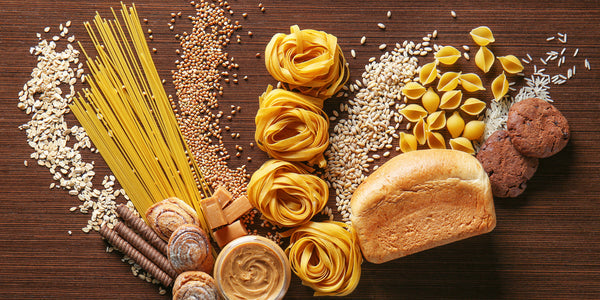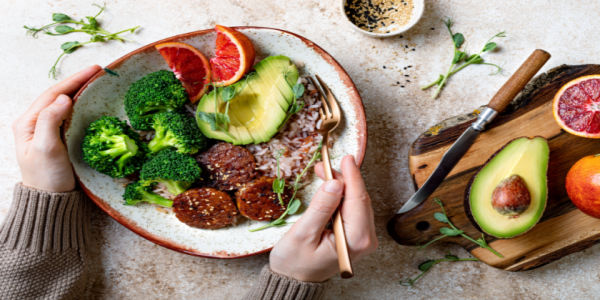
Carbohydrates are found in a wide variety of sources, including whole grains, fruits, vegetables, milk and dairy products, legumes, nuts and seeds, and sweets. The following are considered to be low in carbohydrates:
Whole Grains and Plant-Based Proteins
While whole grains and plant-based proteins may not be the lowest carb sources, they hold great value in the diet.
Quinoa (21 grams)
Quinoa is a valuable plant-based protein while being lower in carbs. Learn how to prepare this versatile seed and incorporate into salads, soups, or this quinoa and pumpkin seed stuffed acorn squash.
Couscous (23 grams)
"So nice, they named it twice!" Similar to quinoa, couscous is a light, yet hearty grain that compliments well with salads, steamed vegetables, or mixed into casseroles.
Lentils (20 grams)
Low in carbs but rich in fiber, protein, and variety! Learn more about colorful lentils here.
Almonds (22 grams)
While nuts are calorically-dense, they are low in carbs but a significant source of protein and healthy fats, making them a satiety-rich snack or nutritious crunch to salads.
Soybeans (30 grams)
Also recognized as edamame, soybeans are extremely valuable for individuals following a plant-based diet. They are a significant protein source and compliment Asian-inspired dishes.
Tempeh and Tofu (8 grams and 1 gram, respectively)
Despite the nutritional curiosity of the soybean-produced tempeh and tofu, they both are low in carb and high in protein. Learn more about their differences here!
*Grams of carbs per 100-gram serving
Fruits
Although fruits contain natural sugar, they offer a natural sweetness and can certainly fit into a low-carb diet plan!
Watermelon (7.55 grams)
Watermelon is an excellent low-carb fruit to keep you hydrated, especially on a warm day.
Strawberries (7.68 grams)
Not only are strawberries a low carbohydrate fruit, but they are rich in fiber, vitamin C, potassium, and folate.
Avocadoes (7.82 grams)
Avocadoes’ low-carb content may even be outshined, as avocadoes are actually a noteworthy source of fat!
Pink Grapefruit (8.08 grams)
This uniquely citrusy, sour, and sweet fruit is enticing, but its low-carb content deserves valuable mention!
Honeydew Melons (9.09 grams)
The juicy honeydew melon obtains its name from its reminiscent flavor when fully ripe, offering subtle tones of honey. But do not let the thought of sugary, sweet honey turn you away, as honeydew is a low-carbohydrate fruit.
*Grams of carbs per 100-gram serving
Vegetables
Most vegetables are considered to be low in carbohydrates, especially leafy greens and cruciferous veggies. Although starchy vegetables offer valuable fiber and nutrients, they tend to be rich in carbohydrates and should have a moderated intake.
Asparagus (3 grams)
Steamed, grilled, simmered, sautéed, or oven-roasted, asparagus is a versatile low-carb veggie.
Bell Peppers (5 grams)
The colorful variations of bell peppers not only provide valuable nutrients, but are low in carbohydrates. Add bell peppers to soups, salads, or give this Greek stuffed pepper a taste.
Broccoli (7 grams)
While hearing "Eat your broccoli!" may have had poor connotations as a child, this cruciferous vegetable is low in carb and displays great versatility. Munch on for a snack, steamed as a side dish, or incorporated into a flavorful casserole.
Cauliflower (5 grams)
Cauliflower’s hype in the health world continues to flourish, and for great reason! It can act as a valuable swap to carb-rich foods, including a lighter variation of mashed potatoes and pizza.
Cucumber (4 grams)
Being mostly comprised of water, this low-carb vegetable is low in carbs while offering hydration properties much like watermelon!
Spinach (4 grams)
Rich in folate, iron, calcium, and other valuable nutrients, spinach is an excellent swap to lettuce or addition to soups and smoothies.
*Grams of carbs per 100-gram serving
Dairy Products
Although milk and dairy products contain a natural sugar better known as lactose, they can still earn their place in a low-carb diet!
Cottage Cheese (8 grams per one cup)
Low in carbs but rich in protein, cottage cheese makes it way to list for good reason. Cottage cheese can be enjoyed on its own, mixed into smoothies, and paired with fresh peaches, pears, and pineapple.
Greek Yogurt (15 grams per ½ cup)
Unlike traditional yogurt, Greek yogurt is a significant protein source. To substantially reduce carb content and added sugars, choose plain over flavored variations. Naturally sweeten with a low-carb fruit or swap sour cream and mayo with plain Greek yogurt for a protein punch.
Eggs
Eggs are essentially free of carbohydrates while being a significant source of protein. Enjoy eggs hardboiled, sunny side-up, or scrambled without fearing the cholesterol-containing yolk!
Goat Cheese
Like eggs, goat cheese has a minuscule supply of carbohydrates. And while most cheeses tend to be high in sodium and fat, goat cheese is considered to be one of the lowest cheeses in carbs, sodium, and fat content. Additional healthful cheeses include mozzarella and parmesan.
Additional Low-Carb Sources
In addition to the low-carb food list indicated above, following the indicated guidelines below can naturally reduce carb content, all while obtaining adequate fiber, ample protein, moderate supply of healthy fats, and essential vitamins and minerals:
Choose Whole Grains Over Refined Products
Especially compared to refined products, whole grains are extremely valuable towards health. They supply the body with ample fiber that contributes to weight maintenance and heart and digestive health.
Look for Color
Choose foods that are naturally colorful rather than packaged foods with color dyes that are often filled with added sugars. Foods rich in color, such as fruits and veggies, tend to supply an ample amount of fiber along with precious vitamins and minerals.
Select Batter-Free Meats
Meats are essentially free of carbohydrates on their own. However, breaded products, such as fried chicken strips, adds unnecessary carbohydrates and unwanted oils. The following are considered to be valuable protein sources, all while being low in carbohydrates: chicken, beef, lamb, pork tenderloin, and other lean meats and "loins". Fish are also an exceptional protein source and often filled with healthful omega-3 fatty acids, along with olive and canola oils.
Look for "Added Sugars"
While sugar is known to be within sweets and pastries, they are oftentimes hidden. Take advantage of the nutrition facts and ingredient labels to identify the amount of sugars within a product. Hidden sources of sugar include dressings and sauces.
BistroMD
With bistroMD, you are ensured to receive adequate nutrition to facilitate weight loss and optimize health. Scientifically-proven, well-balanced meals contribute to 40 to 45 percent lean protein, 30 to 35 percent complex carbohydrates, and 20 to 25 percent healthy fat. BistroMD takes all the guesswork out, only leaving you with greater reasoning to get flavorful, low-carb meals straight to your doorstep!







